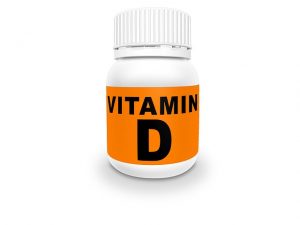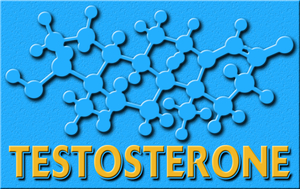Video Link: https://vimeo.com/290594707
Video Download: Click Here To Download Video
Video Stream: Click Here To Stream Video

For those with severe testosterone deficiency, low-t therapy with testosterone injections, creams, or other forms of prescription testosterone is the only way to get testosterone levels back into a state of harmony, but for those struggling with a mild deficiency, or those looking to pump up testosterone levels naturally, there are some steps that you can take to bolster your testosterone production.
You may be aware of some other ways you can promote healthy t-levels, such as anabolic exercise, interval training, and sound sleeping habits, but in this article, we'll be focusing on how diet may impact testosterone balance.
Vitamin D and Testosterone
Vitamins and minerals play a crucial role in promoting testosterone production, absorption, and utilization. Vitamin D is among the most important. Recent studies have shown that, for patients with significant vitamin D deficiency, testosterone levels also become suppressed.
Doctor-monitored vitamin D supplementation was shown to increase testosterone in patients. Of course, in this study, patients were provided with therapeutic levels of vitamin D, which isn't advisable without a doctor's consent and advice.
 On the other hand, it does show us how important vitamin D is for hormone production.
On the other hand, it does show us how important vitamin D is for hormone production.
To make sure your body gets enough vitamin D, you should be getting twenty minutes of substantial sunlight at least twice per week.
The older that you get, however, the harder it is for the body to produce its own vitamin D. In this case, choose dairy products and cereals enriched with vitamin D. Also, fatty fish are an excellent source of vitamin D (as well as omega-3 fatty acids!).
In any case, combine vitamin D supplementation with the consumption of fat to ensure proper absorption.
Zinc and Magnesium for Healthy Testosterone Levels
Just like with vitamin D, magnesium and zinc also play critical roles in hormone production, including testosterone.
Recently published research provides substantial evidence that zinc can help men that are obese overcome estrogen imbalance and help them take further steps to improve their health by encouraging improved testosterone circulation.
Increased magnesium consumption is something that the majority of Americans can benefit from. Among the many reasons why magnesium is so essential is because it helps promote free testosterone levels in the bloodstream.
Most testosterone is bound and inactivated in the bloodstream. Magnesium helps regulate the appropriate level of testosterone in the blood by preventing testosterone from linking with sex-hormone binding globulin.
Fat Intake and Testosterone
 For your body to produce sufficient testosterone, you need to make sure that you get enough fat in your diet.
For your body to produce sufficient testosterone, you need to make sure that you get enough fat in your diet.
Testosterone is one of many hormones that is composed mostly of fat.
Of course, for your heart's sake, it's crucial that you choose a diet with the right kind of fat and the right balance of fat with carbohydrates and protein. It's generally agreed upon that around fifteen percent of your daily caloric intake should come from fat.
You should mainly be getting fat calories from monounsaturated and unsaturated fats. Too much-saturated fat is strongly correlated with heart disease.
Obtaining a good ratio of HDL/LDL cholesterol is also necessary both for sex hormone production as well as proper cardiovascular function. In addition to fatty acids, the body also utilizes cholesterol in the production of testosterone. HDL is good cholesterol, and we need it.
We need LDL cholesterol as well, but it is so abundant in the American diet that a considerable segment of Americans get too much LDL cholesterol and not enough HDL. When our bodies have too much LDL cholesterol, this is disastrous for long-term cardiac health.
Body Fat and Testosterone
It may seem ironic, but the same fat that you consume in your diet that benefits your testosterone levels is a significant hindrance to hormone balance when it's attached to your body.
Your body's fat cells have a nasty habit that can lead to severe issues with testosterone balance if you are significantly overweight or obese — fat cells release their own estrogen.
They also consume precursor hormones intended for testosterone production to produce that estrogen, preventing your body from producing adequate amounts and producing symptoms of low-t, even in men that would be far too young to experience the condition at a lower weight.
About diet, this means that calorie consumption and control are vital to promoting healthy testosterone production, in addition to eating the right combination of foods.
Testosterone and Soy – How Much is Too Much?
 Over the last twenty years, soy has sent some seriously mixed messages.
Over the last twenty years, soy has sent some seriously mixed messages.
Not too long ago, it was believed that soy was a severe offender of the testosterone suppression category, but this no longer appears to be the case under all circumstances.
As with many of the choices that we make with our diets, moderation seems to be the key. Recent studies have shown that light consumption of foods containing phytoestrogens, such as soy and tofu, can protect testosterone production by limiting estrogen production.
On the other hand, if you get too much of these phytoestrogens, this increases the volume of estrogen in the bloodstream, and — as we mentioned earlier, the more estrogen in a man's blood, the less testosterone his body is producing.
Avoid Testosterone Supplements and Amino Acid Supplements
It may be tempting to turn to OTC supplements to try to boost testosterone levels, but we strongly recommend against such a decision.
For one, oral testosterone is broken down into component protein fragments, which isn't going to provide a consistent boost in testosterone levels. Also, both amino acid supplements and oral testosterone can be very hard on the liver, giving minimal benefits at an elevated risk.
If you believe that you may be suffering from low-t, or if you want to use testosterone to improve your strength and vitality, we urge you to only use testosterone after meeting with a licensed physician, and only with a prescription.
Though testosterone replacement therapy can be incredibly beneficial to those that have a clinical need, increasing testosterone levels above the normal range is risky business.
Contact Us Today For A Free Consultation

- Testosterone for Women [Last Updated On: December 1st, 2023] [Originally Added On: December 29th, 2013]
- Testosterone Androgen [Last Updated On: December 11th, 2023] [Originally Added On: December 29th, 2013]
- Testosterone and Body Building [Last Updated On: December 14th, 2023] [Originally Added On: December 30th, 2013]
- Testosterone Levels [Last Updated On: December 6th, 2023] [Originally Added On: December 31st, 2013]
- Testosterone Gel, Cream, and the Testosterone Patch [Last Updated On: November 28th, 2023] [Originally Added On: December 31st, 2013]
- Buy Testosterone | Types of Testosterone Replacement Therapy Programs, Injections, Cream and Gel [Last Updated On: December 13th, 2023] [Originally Added On: December 31st, 2013]
- Buy Testosterone Injections Online, Testosterone Prescription for Low T, Testosterone Replacement Therapy [Last Updated On: October 16th, 2020] [Originally Added On: January 1st, 2014]
- Aging and Testosterone Replacement Therapy [Last Updated On: December 12th, 2023] [Originally Added On: January 3rd, 2014]
- What Causes Low Testosterone [Last Updated On: December 10th, 2023] [Originally Added On: January 7th, 2014]
- Hormone Levels in Men [Last Updated On: December 4th, 2023] [Originally Added On: January 12th, 2014]
- Hormone Level Testing [Last Updated On: November 29th, 2023] [Originally Added On: January 13th, 2014]
- Types of Testosterone Products and Delivery [Last Updated On: December 8th, 2023] [Originally Added On: January 22nd, 2014]
- Testosterone Therapy Helps Men with Low-T Ward Off Prostate Cancer [Last Updated On: May 29th, 2024] [Originally Added On: December 29th, 2019]
- The Importance of Dietary Fat for Testosterone Production [Last Updated On: July 8th, 2024] [Originally Added On: January 2nd, 2020]
- Testosterone Deficiency and Low-T at Epidemic Levels Among Men in the United States [Last Updated On: May 27th, 2024] [Originally Added On: May 17th, 2020]
- The Effects of Testosterone Therapy on Male Patients -- Who Should Use Testosterone? [Last Updated On: December 20th, 2023] [Originally Added On: June 16th, 2020]
- Does Ibuprofen Contribute to Low Testosterone? [Last Updated On: January 27th, 2024] [Originally Added On: June 20th, 2020]
- The Link Between Testosterone and Lower Rates of Autoimmune Diseases Among Men [Last Updated On: January 30th, 2024] [Originally Added On: June 21st, 2020]
- Weight Cycling and the Problem with Crash Dieting [Last Updated On: April 8th, 2024] [Originally Added On: July 30th, 2020]
- Reexamining Bio-Identical Testosterone Therapy [Last Updated On: June 18th, 2024] [Originally Added On: August 12th, 2020]
- Understanding how Muscle and Fat Impact Body Mass, Weight, and Health [Last Updated On: April 15th, 2024] [Originally Added On: August 25th, 2020]
- The Role of Nitric Oxide in Cancer Proliferation And Prevention [Last Updated On: May 3rd, 2024] [Originally Added On: August 26th, 2020]
- Understanding Heartburn in the 21st Century [Last Updated On: April 24th, 2024] [Originally Added On: August 28th, 2020]
- What is Erectile Dysfunction? [Last Updated On: April 20th, 2024] [Originally Added On: August 30th, 2020]
- Sermorelin Acetate Drug Information [Last Updated On: April 7th, 2024] [Originally Added On: August 31st, 2020]
- Exercise and Mental Health [Last Updated On: April 5th, 2024] [Originally Added On: September 1st, 2020]
- The Importance of Proteins, Carbs, and Fats [Last Updated On: March 11th, 2024] [Originally Added On: September 2nd, 2020]
- Low-T Treatment Before and After -- How Testosterone Therapy Improves Vitality [Last Updated On: April 9th, 2024] [Originally Added On: September 6th, 2020]
- Changes to LabCorp Guidelines for Low-T Diagnosis and How They Impact Your Treatment [Last Updated On: July 14th, 2024] [Originally Added On: September 22nd, 2020]
- The Effects of Testosterone on Asthma Prevalence Among Men and Women [Last Updated On: February 19th, 2024] [Originally Added On: October 6th, 2020]
- 7 Exercises to Elevate Testosterone Levels [Last Updated On: June 13th, 2024] [Originally Added On: October 10th, 2020]
- Vitamin A is Essential for Good Health - Are You Getting Enough ? [Last Updated On: April 16th, 2024] [Originally Added On: October 14th, 2020]
- The Significance of Telomeres in Stem Cell Treatments [Last Updated On: March 16th, 2024] [Originally Added On: November 27th, 2020]
- The Influence of Testosterone on Protective Mating Behaviors in Men [Last Updated On: January 25th, 2024] [Originally Added On: December 6th, 2020]
- The Role of Testosterone in Women's Health [Last Updated On: December 24th, 2023] [Originally Added On: December 7th, 2020]
- Testosterone Promotes Bone Health and Can Help Treat Osteoporosis [Last Updated On: February 15th, 2024] [Originally Added On: December 17th, 2020]
- The Relationship Between Testosterone and Cortisol [Last Updated On: April 2nd, 2024] [Originally Added On: December 19th, 2020]
- The Importance of Sex Hormone-Binding Globulin (SHBG) for Healthy Testosterone Levels [Last Updated On: March 9th, 2024] [Originally Added On: December 28th, 2020]
- 12 Health Issues That Can Kill Libido and Limit Sexual Performance [Last Updated On: May 23rd, 2024] [Originally Added On: January 3rd, 2021]
- 4 Foods to Boost Your Testosterone Levels [Last Updated On: February 7th, 2024] [Originally Added On: January 4th, 2021]
- Low Testosterone Symptoms [Last Updated On: December 31st, 2023] [Originally Added On: January 7th, 2021]
- Is Male Menopause Real? The Science of Andropause [Last Updated On: January 15th, 2024] [Originally Added On: January 11th, 2021]
- Relieve Fatigue and Increase Energy with Testosterone Replacement Therapy [Last Updated On: January 16th, 2024] [Originally Added On: January 16th, 2021]
- How to Administer a Testosterone Injection -- Low-T Injection Guide [Last Updated On: February 28th, 2024] [Originally Added On: January 17th, 2021]
- Testosterone Levels Associated with Serotonin Activity in the Brain [Last Updated On: March 26th, 2024] [Originally Added On: January 19th, 2021]
- Grumpy Old Man Syndrome – Causes and Treatments [Last Updated On: June 8th, 2024] [Originally Added On: January 22nd, 2021]
- The Effects of Beer on Testosterone Production and Gynecomastia [Last Updated On: March 21st, 2024] [Originally Added On: January 30th, 2021]
- Testosterone Frequently Asked Questions [Last Updated On: February 6th, 2024] [Originally Added On: February 26th, 2021]
- Testosterone Supplements: Vitamin and Amino Acid Pills Versus Real Testosterone [Last Updated On: November 21st, 2024] [Originally Added On: March 1st, 2021]
- Testosterone Side Effects, Risks, Dangers and Negative Effects [Last Updated On: November 7th, 2024] [Originally Added On: March 2nd, 2021]
- Testosterone for Men [Last Updated On: February 20th, 2024] [Originally Added On: April 13th, 2021]
- Testosterone Testing [Last Updated On: November 9th, 2024] [Originally Added On: May 7th, 2021]
- Hormone Replacement Therapy: Commonly Asked Questions [Last Updated On: February 20th, 2024] [Originally Added On: June 16th, 2023]
Word Count: 1009




















